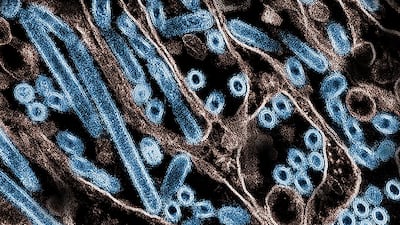The US announced its first severe human case of bird flu (H5N1) and a state of emergency was declared in California on Wednesday.
The Centres for Disease Control and Prevention reported that a patient was admitted to hospital for a “severe case of avian influenza” in Louisiana, in the “first instance of severe illness linked to the virus in the United States”.
The health agency believes that the patient was exposed to sick and dead birds but an investigation is being conducted.
Spread of bird flu on dairy farms across the country has raised the alarm among public health experts over the disease's pandemic potential. The outbreak has led to recalls of raw milk and the US Agriculture Department last week ordered that the wider milk supply be tested for bird flu.
There have been 61 reported human cases of H5 bird flu in the US, but experts say there could be more. Similar outbreaks have occurred in Australia, Canada, China and other countries.
“This is the first time we have seen the infections from dairy cattle to humans, and so many within the US,” Dr Maria Van Kerkhove, director of epidemic and pandemic threat management at the World Health Organisation, said in a briefing on Tuesday.
The CDC insists that there is no human-to-human transmission of the virus and that the chances of such an event are low.

Dr Van Kerkhove said the WHO is not aware of “reported or identified human-to-human transmission” but “this can change quickly as the virus is evolving, which is why we are actively assessing the situation and why surveillance is so critical”.
Hours after the CDC's announcement, California Governor Gavin Newsom declared a state of emergency to strengthen the response to the spread of the disease.
The virus has been detected in 647 dairies in California, half of them in the past month. The state has also reported 34 human cases, mostly in people in direct contact with infected herds.
“This proclamation is a targeted action to ensure government agencies have the resources and flexibility they need to respond quickly to this outbreak,” Mr Newsom said in a statement.
The emergency will allow California to allocate more funds to its response, giving personal protection equipment to high-risk farm workers, increasing education about the virus, reducing raw milk consumption, and increasing surveillance of infections and potential cases.
“While the risk to the public remains low, we will continue to take all necessary steps to prevent the spread of this virus,” Mr Newsom said.


